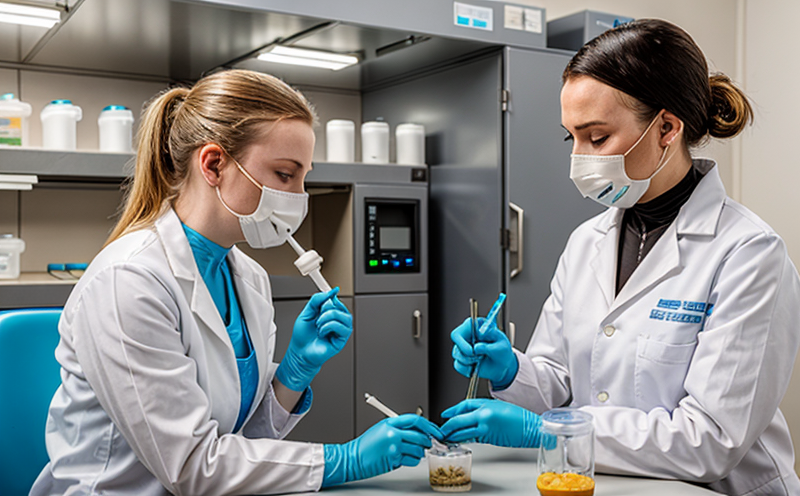ASTM E3181 T-2/HT-2 Toxin Analysis in Cereal Products
The analysis of T-2 and HT-2 toxins in cereal products is a critical process for ensuring food safety, particularly in the production of cereals such as oats, wheat, barley, and other grains. These mycotoxins are produced by fungi under certain environmental conditions and can pose significant health risks when consumed in contaminated products.
The ASTM E3181 standard provides a robust framework for the quantitative analysis of T-2 and HT-2 toxins. This service focuses on detecting these toxins to ensure compliance with international standards such as EU regulations (Commission Regulation (EU) No 465/2016). Our laboratory adheres strictly to this method, ensuring accurate and reliable results.
The process involves the following steps:
- Sample preparation: Properly handling the cereal samples is crucial for accurate analysis. Samples are homogenized before extraction using a solvent compatible with the mycotoxins of interest.
- Cleanup and concentration: To ensure that only the target toxins are detected, we use advanced cleanup techniques such as solid-phase extraction (SPE).
- Instrumentation: The extracted analytes undergo analysis via liquid chromatography-tandem mass spectrometry (LC-MS/MS), which is the gold standard for mycotoxin detection.
- Data interpretation: Our team of experts interprets the data and provides detailed reports outlining the levels of T-2 and HT-2 toxins present in the sample.
Our laboratory ensures that all testing adheres to ASTM E3181, which specifies a validated method for the quantitative determination of T-2 and HT-2 toxins. This ensures accurate and reproducible results, providing peace of mind to our clients regarding the safety of their products.
The importance of this analysis cannot be overstated. By identifying even trace amounts of these mycotoxins, we can help prevent potential health risks associated with contaminated cereal products. Our service is essential for quality managers, compliance officers, R&D engineers, and procurement teams who are responsible for ensuring food safety.
Our laboratory’s expertise in this area ensures that our clients receive accurate and reliable results, which are critical for maintaining brand integrity and consumer trust. We pride ourselves on providing timely and actionable insights to help our clients make informed decisions about their products.
International Acceptance and Recognition
The ASTM E3181 standard is widely recognized and accepted in the food safety industry, particularly in Europe. The EU has specifically referenced this method for T-2 and HT-2 toxin analysis in its regulations, making it a de facto standard for cereal products.
- EU Regulation (EU) No 465/2016: This regulation mandates the use of LC-MS/MS for the detection of T-2 and HT-2 toxins. Our laboratory ensures compliance with this directive by using ASTM E3181.
- FAO/WHO Guidelines: The Food and Agriculture Organization (FAO) and World Health Organization (WHO) recommend LC-MS/MS for the analysis of mycotoxins in food products. Our adherence to ASTM E3181 aligns with these international guidelines.
- International Standards Bodies: ASTM, ISO, EN, IEC: Our laboratory is committed to using internationally recognized standards to ensure that our results are both accurate and comparable on a global scale.
The use of this method ensures that our clients can confidently comply with international regulations and guidelines. By leveraging the expertise and precision of ASTM E3181, we provide a service that is trusted by industry leaders worldwide.
Environmental and Sustainability Contributions
The analysis of T-2 and HT-2 toxins in cereal products plays an important role in environmental sustainability. By identifying contaminated crops early in the production process, we help prevent the distribution of potentially harmful products to consumers.
This service contributes to sustainability efforts by:
- Reducing food waste: Early detection allows for the segregation and proper disposal of contaminated batches, minimizing the amount of grain that ends up as waste.
- Supporting responsible farming practices: By identifying problematic fields early in the production cycle, farmers can implement corrective measures to prevent future contamination.
- Enhancing consumer trust: Providing accurate and reliable testing results helps ensure that consumers are purchasing safe products, which is crucial for maintaining long-term brand loyalty and market reputation.
- Fostering innovation in agricultural practices: Our laboratory’s expertise can inform new strategies to combat mycotoxin contamination, contributing to a more sustainable food production system.
Through our commitment to using ASTM E3181, we help our clients maintain high standards of quality and safety, which is essential for the long-term sustainability of the agricultural industry.
Competitive Advantage and Market Impact
- Regulatory Compliance: By adhering to ASTM E3181, our clients can ensure that their products are in full compliance with international regulations. This reduces the risk of legal penalties and helps protect brand reputation.
- Enhanced Consumer Trust: Our laboratory’s expertise ensures that the products meet the highest standards of safety, which is crucial for building consumer trust and loyalty.
- Innovation in Product Development: By identifying potential contamination early, our clients can innovate and improve their product lines to better meet market demands.
- Increased Market Access: Compliance with international standards such as ASTM E3181 opens up new markets for our clients, allowing them to expand their reach into regions that have stringent regulations.
- Competitive Edge: By providing accurate and reliable results, we help our clients stay ahead of competitors who may not adhere to the same rigorous standards.
- Cost Savings: Early detection of contamination allows for corrective measures to be implemented before significant financial losses occur due to contaminated products reaching market shelves.
- Promotion of Responsible Stewardship: Our clients can showcase their commitment to responsible stewardship and food safety, which is increasingly important in today’s consumer-driven market.
By leveraging the expertise provided by ASTM E3181, our laboratory helps clients maintain a competitive edge and ensure that they are meeting global standards for food safety and quality. This service not only supports compliance but also drives innovation and enhances sustainability practices within the industry.





